Key takeaways:
- Dyslexia requires empathetic and innovative teaching methods, acknowledging that traditional learning may not suit all students.
- Audiobooks provide accessibility and engagement for learners with dyslexia, enhancing comprehension, listening skills, and fostering a love for learning.
- Choosing the right audiobooks tailored to a student’s interests and reading level significantly impacts their learning experience and confidence.
- Integrating audiobooks with discussions and routines can transform literacy practices, create a supportive learning environment, and encourage meaningful connections among students.

Understanding Dyslexia and Learning
Dyslexia isn’t just a reading challenge; it’s a different way of processing information. I remember the first time I realized that learning wasn’t a one-size-fits-all approach. It made me wonder: how many children struggle with traditional methods, feeling frustrated when they could thrive with alternatives like audiobooks?
When I started learning about dyslexia, I quickly grasped the emotional toll it can take on learners. The anxiety of feeling “less than” hit home for me, as I recognized similar feelings in others around me. How do we bridge that gap for students who often feel defeated, yet possess incredible potential waiting to be unlocked?
Understanding dyslexia requires empathy and innovation in teaching methods. I recall a moment with a close friend who found great joy in audio learning. Seeing their excitement made me realize that embracing diverse learning styles can truly transform educational experiences, leading to confidence and success. Isn’t it time we celebrate those differences?
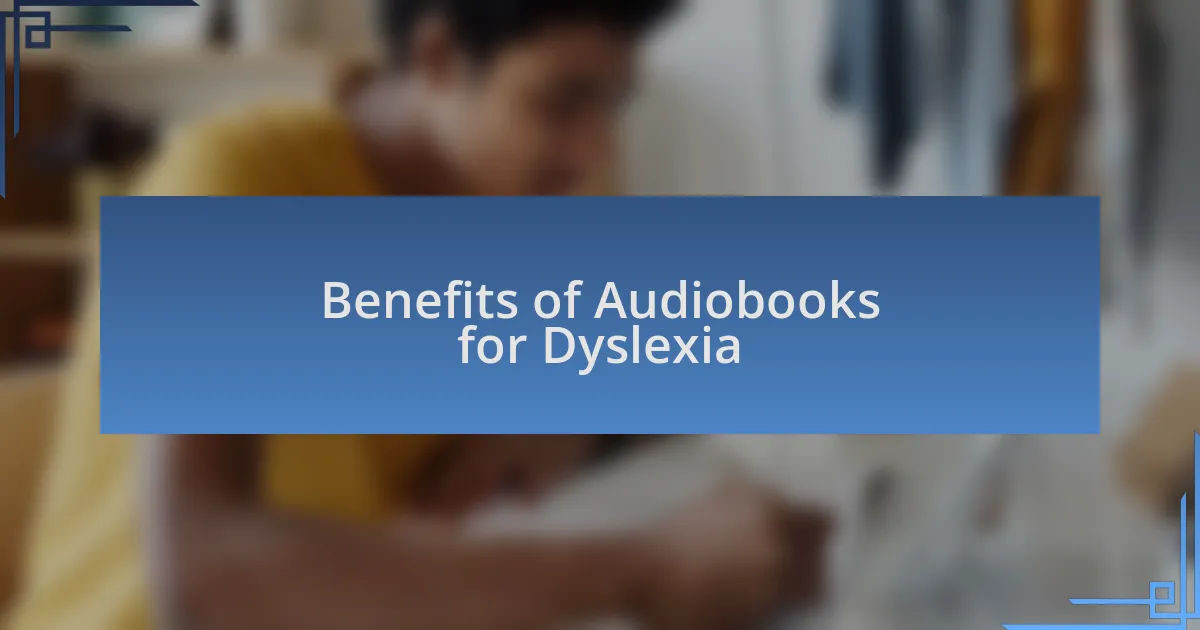
Benefits of Audiobooks for Dyslexia
Audiobooks offer a remarkable advantage for individuals with dyslexia by providing access to literature without the barriers of traditional reading. I recall a student I worked with who struggled to decode words on a page. Once they discovered audiobooks, a light bulb went off; they could finally enjoy stories without the frustration of misreading. It was like unlocking a treasure chest of imagination and knowledge previously out of reach.
Additionally, audiobooks can help improve listening skills, an often-overlooked benefit. I often emphasize to my students that comprehension doesn’t always rely on written text. One student told me they enjoyed following along in a physical book while listening, which made the experience engaging and interactive. It was gratifying to witness their confidence grow as they connected words they had struggled with through auditory reinforcement.
Finally, the convenience of audiobooks means learners can engage with content anytime and anywhere. I remember my own experiences with late-night study sessions and long commutes; hearing narratives on my journey turned mundane tasks into opportunities for learning. What if we could harness that flexibility for children with dyslexia? It’s a game-changer, allowing them to absorb knowledge and stories on their terms, fostering a love for learning that lasts a lifetime.
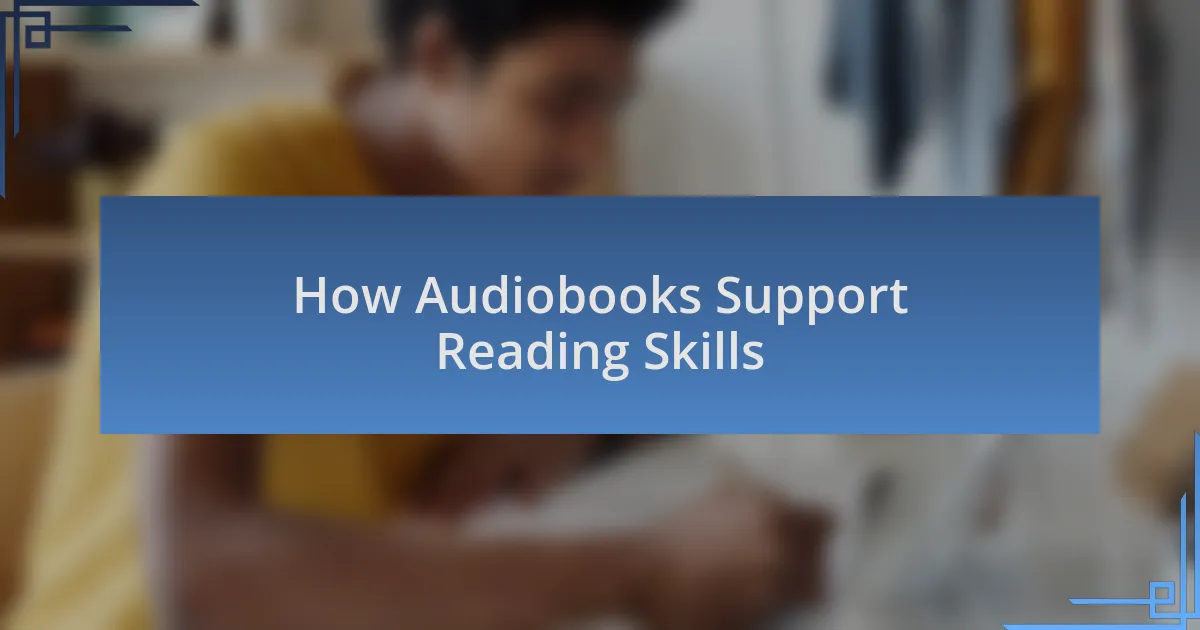
How Audiobooks Support Reading Skills
Audiobooks actively bolster reading skills by allowing learners to hear the rhythm and cadence of language. I remember one of my younger students awakening to the world of storytelling through a beloved audiobook series. As they listened, I noticed their pronunciation and fluency improve, as if the words danced off the page in harmony with their growing understanding. This auditory experience not only nurtured their vocabulary but also instilled a deeper appreciation for the art of storytelling.
Listening to audiobooks can also pave the way for critical thinking and empathy. Once, I guided a group discussion after they listened to a poignant story about friendship and resilience. The insights they shared were remarkable, almost as if the audio experience had created a shared emotional landscape. How often do we get the chance to explore complex themes together? Audiobooks make literacy a communal journey, allowing students to engage not just with the text but with each other.
Moreover, audiobooks often enhance motivation and engagement with reading. I have seen students who once approached books with hesitation feel their enthusiasm reignite when an audiobook was introduced. There’s something empowering about choosing a story that captivates one’s interest, especially when the mode of delivery allows them to focus on the narrative rather than decoding every single word. When students feel this sense of joy and ownership, it’s a magical moment that can transform their entire relationship with reading.
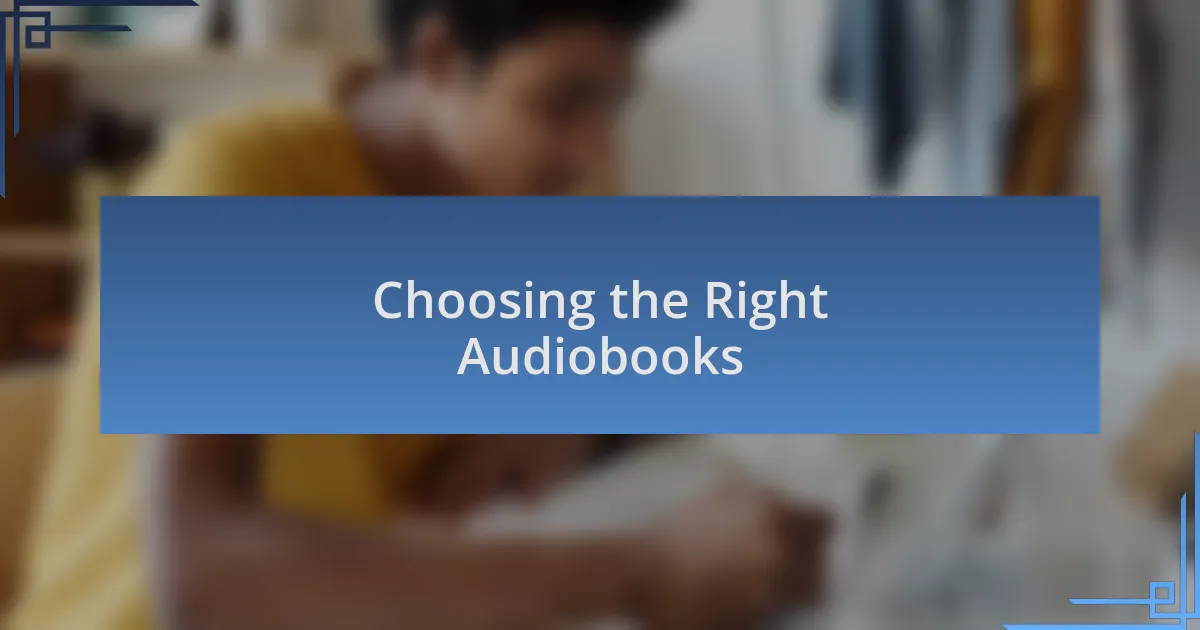
Choosing the Right Audiobooks
Choosing the right audiobooks can significantly impact a learner’s experience, especially for those with dyslexia. I once picked a science fiction novel that my student had been eager to explore, but the complex vocabulary proved overwhelming. It made me realize how crucial it is to select materials that match both the reader’s interests and their current reading level, ensuring they feel challenged, yet not discouraged.
I also believe it’s vital to consider the narration style. I vividly recall a time when I selected an audiobook read by a dynamic narrator who brought the characters to life. The emotion conveyed through their voice sparked my students’ imaginations and fueled their desire to discuss the plot. Have you ever noticed how a captivating voice can create a lasting connection to a story? It’s that level of engagement that makes the right audiobook stand out.
Additionally, themes and topics in audiobooks can resonate deeply with young listeners. I remember suggesting a book that tackled issues of self-acceptance. The conversations that followed revealed how much students related to the characters’ journeys, allowing them to express their thoughts and feelings in a supportive environment. Choosing audiobooks with relatable themes can unlock discussions that cultivate confidence and understanding, enriching the entire learning process.
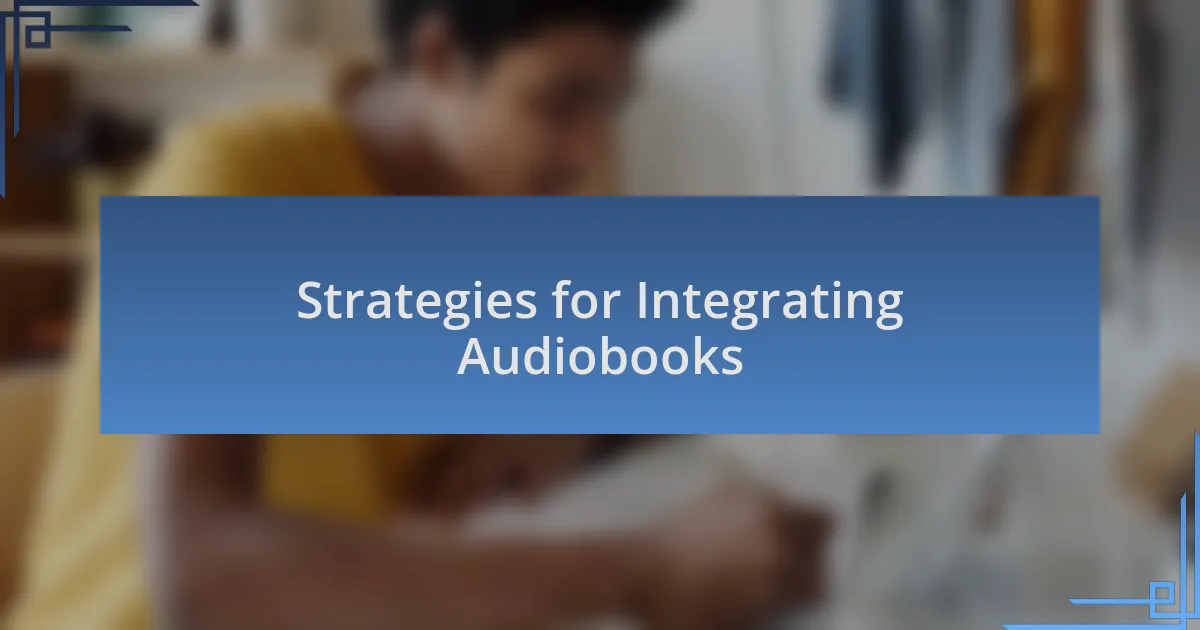
Strategies for Integrating Audiobooks
Integrating audiobooks into a learning routine can be a transformative experience for students with dyslexia. I recall a student who struggled with traditional reading; we decided to pair the audiobook with the physical book. As they listened, I noticed their confidence grow. The words on the page became less intimidating when paired with the auditory experience, bridging the gap between comprehension and enjoyment. Have you tried this method? It’s like unlocking a new door to literacy.
Another effective strategy is incorporating discussions around the audiobooks after listening. I once hosted a session where students shared their thoughts, and it became a space of exploration and connection. They were animated, exchanging interpretations and feelings about the characters and plot. This interaction not only deepened their understanding but also fostered a supportive community. Engaging students in dialogues can uncover insights I hadn’t even anticipated.
Finally, creating a routine around audiobook listening can significantly enhance retention and enjoyment. I often scheduled specific times when we would listen together, turning it into a shared experience. The anticipation built up excitement, and I could see students eagerly waiting for our next session. How can you establish that kind of rhythm in your own practice? Consistency creates a comfortable framework, making the process feel less like a chore and more like an adventure in learning.
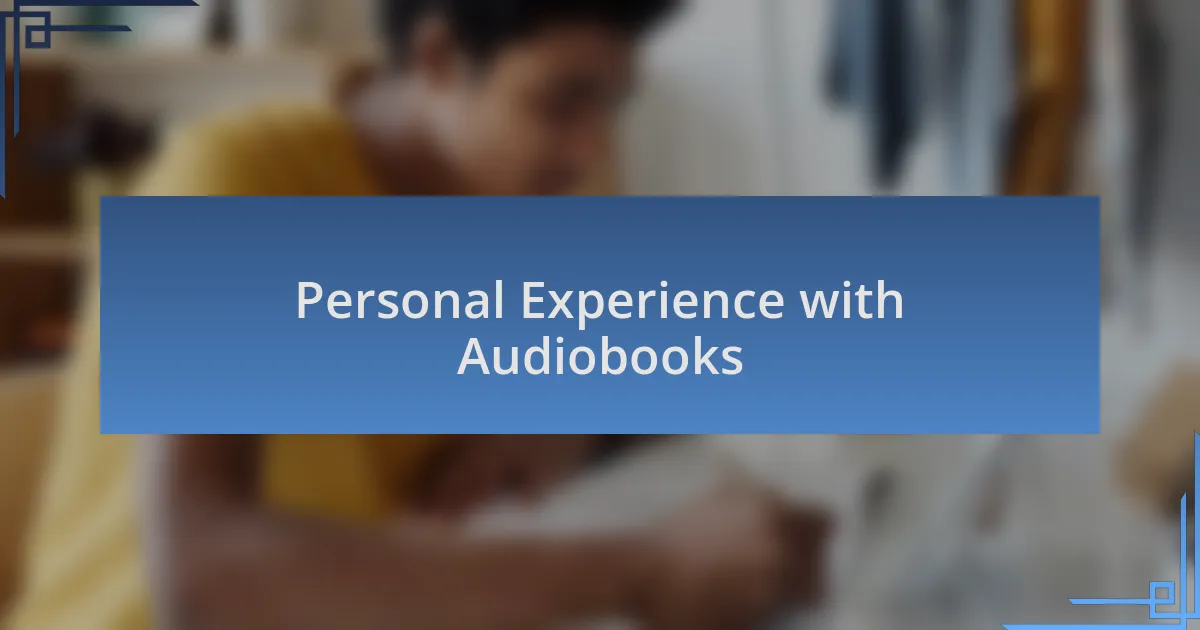
Personal Experience with Audiobooks
Listening to audiobooks has been a game changer for me personally. I remember the first time I paired an audiobook with a challenging text. At first, I was skeptical, afraid it might seem like cheating. However, the moment I heard the words come to life, it felt as if a lifelong barrier began to crumble.
I’ve also observed how the rhythm of an audiobook can create a calming atmosphere, especially during tense study sessions. There was a day when a particularly frustrated student sat down, overwhelmed by their assignments. As they listened to the narrator’s voice flow through the story, I witnessed a palpable shift in their demeanor. Their body relaxed, and suddenly, the text became less daunting.
One evening, as I finished a captivating audiobook myself, I felt a stirring sense of fulfillment. Could audiobooks not only enhance comprehension but also revive that love for stories that dyslexia had once dimmed? Sharing this sense of wonder with my students encouraged many of them to explore genres they hadn’t considered before, igniting their imaginations in ways I had never expected.
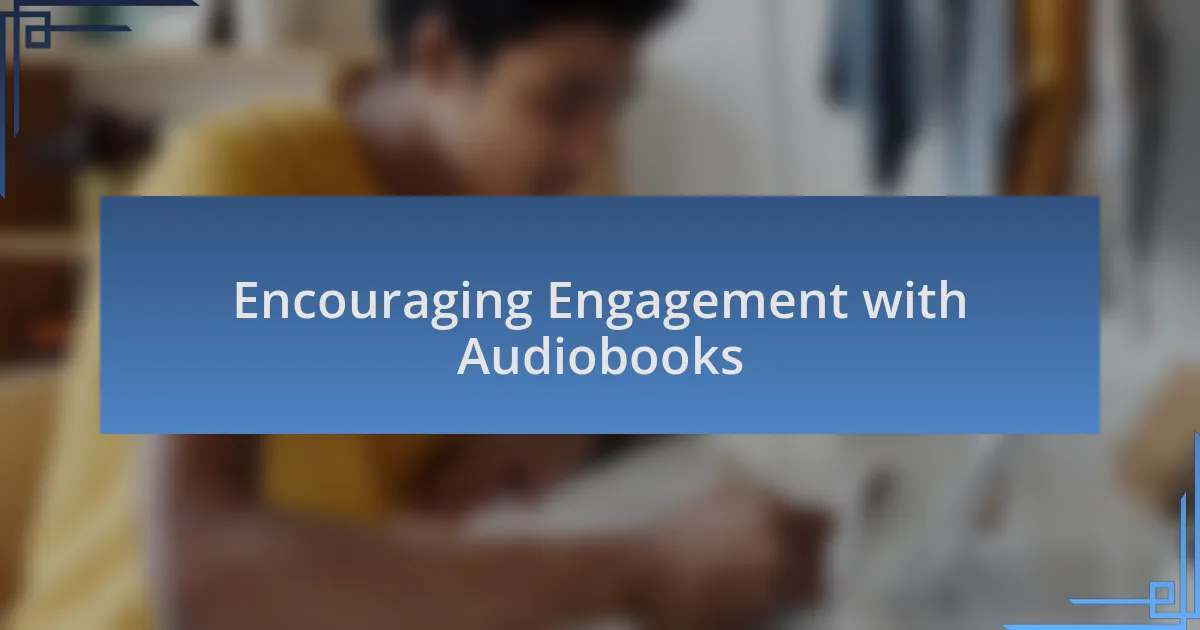
Encouraging Engagement with Audiobooks
Creating an inviting atmosphere for audiobooks can significantly enhance engagement. I remember setting up a cozy corner in my classroom decorated with soft pillows and dim lighting specifically for audiobook listening sessions. The moment I turned on the narrator’s voice, the transformation was astonishing; students who were usually reluctant to participate suddenly leaned in, fascinated by the worlds unfolding before them.
One strategy I found effective was encouraging discussions after listening sessions. I often asked open-ended questions about themes or character decisions, prompting students to share their thoughts. It was heartwarming to see shy individuals come alive, passionately debating a character’s choices. This not only deepened their comprehension but also fostered a sense of community among the students.
Moreover, I’ve integrated audiobooks related to their personal interests into our curriculum. For instance, when I introduced an audiobook about a young inventor, it sparked a wave of creativity among students. They began sharing their dreams and ideas, reminding me that audiobooks are more than just stories—they can be catalysts for inspiration and self-expression. Have you ever witnessed such a transformation through shared stories? It’s a powerful reminder of how narratives connect us all.